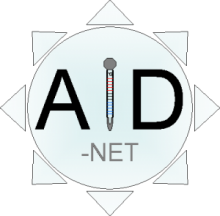AID-Net - Network for Autoinflammatory Disorders in Children and Adolescents
Autoinflammatory syndromes in children and adolescents: Genetics, disease mechanisms, diagnostic markers and therapeutic targets

Autoinflammatory diseases (AID) are characterized by recurrent, self-limited episodes of fever and inflammation. Familial Mediterranean Fever (FMF) is caused by mutations in the MEFV gene. Other inherited AID (like cryopyrin associated peridodic syndromes, CAPS) are linked to defects in the NALP-3 inflammasome with uncontrolled processing of Interleukin-1 beta (IL-1ß). Another autoinflammatory disease without clear genetic background identified so far is Systemic onset Juvenile Idiopathic Arthritis (SoJIA).
Even in disorders with known genetic defects, the genotype-phenotype correlation is weak indicating that confounding factors involving immune dysregulation may be present. Especially IL-1, IL-6 and IL-18 as well as phagocyte-specific S100-proteins (S100A8, S100A9 and S100A12) are correlated with disease activity and secondary complications. Beside IL-6 all these molecules are secreted by a so-called alternative pathway. A loss of control of the alternative secretory pathway seems to be involved in release of innate immune factors leading to autoinflammation.
The primary research goal of this consortium is to elucidate the pathophysiology of autoinflammatory syndromes. Scientific projects focusing on secretory pathways and novel effector mechanisms of innate immunity have been combined with translational approaches to identify genetic and serological markers. This will help to stratify patients, monitor disease activity and therapy, or predict disease outcomes. Finally, novel targets for therapeutic approaches may be identified.
Projects- Rolle von proinflammatorischen S100-Proteinen in autoinflammatorischen Syndromen (Prof. J. Roth, Münster)
- Regulation der IL-1ß-Synthese durch inflammatorische Caspasen und neue IkB-Proteine (Prof. K. Schulze-Osthoff, Tübingen)
- Charakterisierung IKKß-defizienter myeloider Progenitorzellen und die Rolle der gestörten NF-kB Aktivierung bei der systemischen juvenilen iodiopathischen Arthritis (Prof. F. Greten, München)
- Rolle von PI(4,5)P2-induzierter Oligomerisierung und Membraninsertion bei der unkonventionellen Sekretion von FGF2. (Prof. Dr. Walter Nickel, Heidelberg)
- Sekretionsweg des immunmodulatorischen Proteins Annexin A1 (Prof. V. Gerke, Münster)
- Ausbau der bereits bestehenden Biomaterialbank zur Sammlung und Analyse von Patienten-Serum (PD H. Wittkowski, Münster)
- Einrichtung einer genetischen Biobank für autoinflammatorische Erkrankungen (Prof. D. Foell, Münster)
- Zentrales Register für das AID-Netzwerk (Dr. E.Lainka, Duisburg-Essen)
Institut für Immunologie
Universität Münster
Röntgenstr. 21
48149 Münster
Tel.: 0251 83-56577
Fax: 0251 83-56549
E-Mail: rothj@uni-muenster.de
Internet: http://www.campus.uni-muenster.de/immunologie_aid-net.html